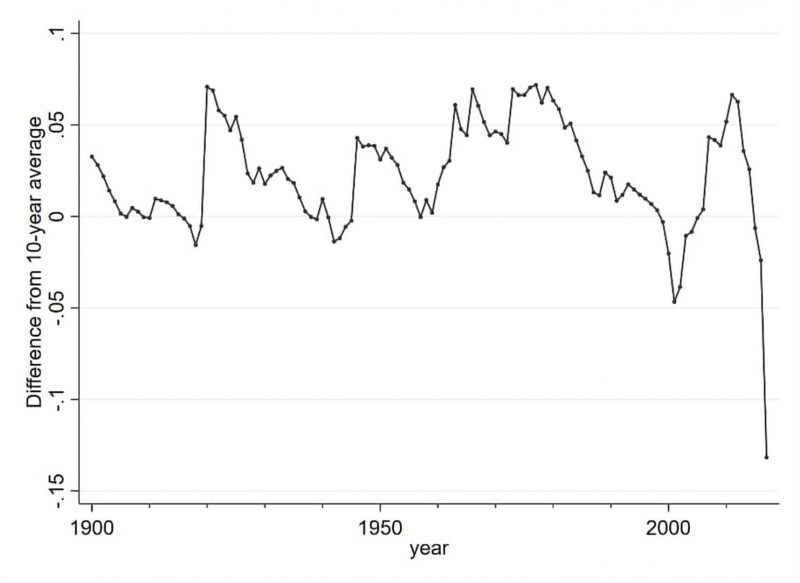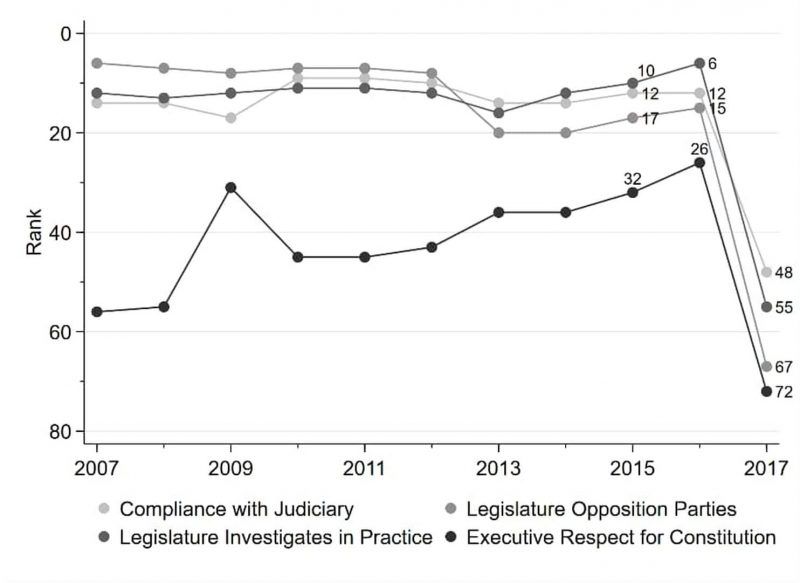Many scholars have argued that democracy — particularly in the United States — is under threat. Examples include Steven Levitsky and Daniel Ziblatt’s analysis of democratic backsliding and Yascha Mounk’s stringent critique of whether American democracy truly represents its citizens. Our newly released 2018 Varieties of Democracy (V-Dem) Project report rates the state of democracy across 178 countries, offering the most updated, comprehensive assessment of where things stand.
A year ago, in 2017, we found that democracy was on the decline — but not as much as many pundits believed. Today, we are less optimistic than we were a year ago. Our new report shows that democracy’s decline is gaining momentum: One-third of the world’s population lives in a backsliding democracy.
This is how we did our research
These conclusions are based on new data released by the V-Dem Project, the largest-ever social-science effort to measure democracy around the world.
The survey asks more than 3,000 scholars and other country experts to evaluate each of 178 countries on the quality of core features of democracy. These experts distinguish between de jure and de facto democratic countries. For example, most countries today hold elections, but some of these elections are free and fair while others are severely rigged.
V-Dem usually asks five experts to evaluate each country on many features that characterize democracy. V-Dem then aggregates the expert assessments using a custom-built statistical model, including an estimate of uncertainty. When we speak of “significant” changes, we refer to changes that are notable even after taking this uncertainty into account.
Here we focus on the Liberal Democracy Index (LDI), which assesses whether there are free and fair elections; whether leaders are constrained by the rule of law and oversight by parliament and the judiciary; and whether civil liberties are protected.
Here are three takeaways.
Democracy is declining worldwide
At the end of 2017, most people in the world lived in democracies. But since then, one-third of the world’s population — or 2.5 billion people — have lived through “autocratization,” in which a leader or group of leaders began to limit those democratic attributes and to rule more unilaterally. The current autocratization trend is visible across the world — and affects Europe and the whole American continent. Only sub-Saharan Africa shows some democratic improvements on average.
And for the first time since 1979, the same number of countries (24 in total) are backsliding on democracy as are advancing. In the United States, weakening constraints on the executive branch have resulted in a significant decline of liberal democracy.
What’s more, only 15 percent of the world’s population lives in countries where everyone, regardless of gender or socioeconomic status, has roughly equal access to political power. Women enjoy at least somewhat — but not fully — equal access to political power in most Western countries, including the United States, as well as other countries such as Costa Rica, Rwanda, Ghana and Benin.
People with average levels of income have almost as much influence on politics as rich people in many Western countries — but not in the United States. On this indicator, the United States scores lowest among all Western countries, ranking 75th globally. One in four people, or almost 2 billion people, live in countries where the more economically well-off have gained more political power in the past 10 years.
The most populous countries have been disproportionately affected
Four of the 10 most populous countries of the world have been affected by autocratization — India, the United States, Brazil and Russia. The most populous democracy — India — has become less democratic as the Hindu-nationalist government led by the Bharatiya Janata Party has passed or enforced stricter laws and regulations that reduce the media’s freedom to criticize the government and that restrict the range of expression. However, India’s elections are still considered free and fair.
Brazilian journalists face increasing harassment when reporting about the major political corruption scandals that have shaken the country in recent years. What’s more, after years of political crisis, political opponents show less respect for each other in public debate. Such polarization harms democratic institutions in the long run.
President Vladimir Putin’s Russia now appears at the bottom end of our Liberal Democracy Index ranking because of decades of increasing repression against opposition activists and critical media. Twenty-six countries separate Russia from North Korea at the bottom end of the scale.
Other large countries in democratic decline over the past 10 years include Congo, Turkey, Thailand, Ukraine and Poland.
Democracy declined precipitously in the United States
The United States fell 24 places in the country ranking on liberal democracy over the past two years, from seventh in 2015 to 31st in 2017. When we compare the United States’ score in 2017 with its average score over the past 10 years, the drop is precipitous and unprecedented.

Experts lowered their estimates of democracy in the United States because they began to be skeptical that the U.S. Congress will rein in executive overreach. Similarly, experts lost faith that the opposition party can contribute to overseeing, investigating or otherwise checking the majority party. The U.S. executive branch was assessed as showing less respect for the Constitution and compliance with the judiciary, two indicators that the judicial branch can restrain the executive.
For all four indicators, the score for the United States declined. The downward trend in the United States is much worse than in other countries. In terms of government compliance with decisions of the Supreme Court, the United States used to rank among the top countries of the world — but has now declined to No. 48.

V-Dem experts assessed elections in the United States between 2002 and 2014 as fully free and fair, but the 2016 one only as “somewhat” free and fair. Across the past decade, experts also noted a slight decline in the range of perspectives provided in major print and broadcast media, which corresponds to the intense debate about biased media in the United States.
We do not observe significant changes in the aggregate Electoral Democracy Index, however, which suggests that experts believe U.S. electoral democracy is relatively robust despite the weakening of liberal aspects of democracy in the United States
Anna Lührmann is the deputy director of the V-Dem Institute and assistant professor at the University of Gothenburg. From 2002 to 2009, she was a member of the German National Parliament.
Matthew Wilson is a visiting researcher at the V-Dem Institute and an assistant professor at West Virginia University.
